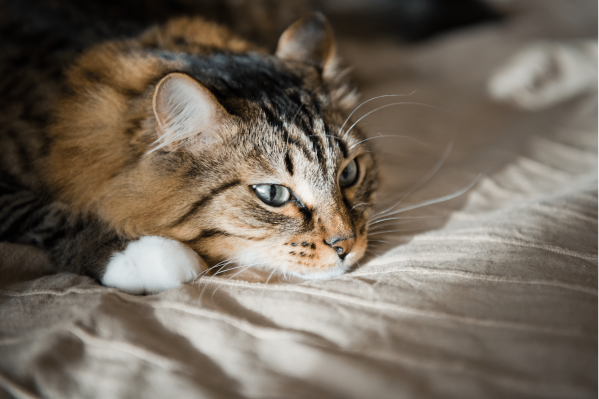There are a few things worse than seeing our fur babies in pain. When a pet is in pain, they can’t explain what is wrong or where it hurts. But regardless of the causes or symptoms, we just want to make them feel better.
So what can you give a cat for pain? The obvious solution might be to try what works for us humans, but the pain relievers humans take can be deadly for pets, especially for cats.
It's important to understand the signs that your cat is in pain, why over-the-counter (OTC) medications are harmful to cats, and what pet parents can safety give their felines to provide some relief.
Signs your cat is in pain
Cats have high pain thresholds, so if they're exhibiting signs or symptoms of pain, like limping, the situation may be more serious than you think. Here are some other signs and behavior signatures that might mean your cat is in pain.
Limping/reduced mobility
Loss of appetite
Noticeable behavior changes
Withdrawal/hiding for long periods
Over- or under-grooming
Avoiding being picked up/played with
Decreased activity levels
Crying, meowing excessively, or growling
Increased aggression
Why are OTC pain medications harmful to cats?
Acetaminophen
Cats metabolize (a process in which the liver and kidneys filter and absorb a drug) very differently than humans, and even dogs. Acetaminophen (Tylenol) is especially harmful to cats since they are unable to metabolize the drug, and it therefore causes a toxicity in the body.
Acetaminophen toxicity results in changes to the red blood cells, causing them to be unable to sufficiently carry oxygen to all the tissues and organs in the body. This results in blue or brown gums, weakness, increased heart rate, increased breathing, difficulty breathing, open mouth breathing, and ultimately death if not treated immediately. An acetaminophen toxicity can occur with a very small dose and signs can start to develop as quickly as four hours.
Ibuprofen
Similar to acetaminophen, ibuprofen should also never be given to a cat for pain or inflammation. Small doses can cause damage to the red blood cells, liver, and kidneys due to their inability to metabolize the drug. Signs of ibuprofen toxicity include stomach and intestinal ulcers, vomiting with or without blood, diarrhea with or without blood, abdominal pain, lethargy, dark and tarry stools, and pale gums. Cats can also stagger when walking, have a yellow color of the skin, whites of the eyes and gums, tremors, seizures, and even become comatose.
Aspirin
Aspirin can cause some of the same toxic signs as acetaminophen and ibuprofen. The most common side effects are stomach and intestinal ulcers, bleeding in the GI tract, and abdominal pain. The additional signs are similar to ibuprofen toxicity.
What can I give my cat for pain?
Prescription drugs
Since the OTC pain medications for humans are extremely harmful and toxic to cats, what can they safely take for pain? Several prescription pain relievers have been tested and proven safe and effective for cats. These medications include NSAIDs, opioids, and other pain medications such as gabapentin and tramadol. A veterinarian should always prescribe and monitor any use of pain medications, especially NSAIDs, since even the pain medications that have been tested can cause serious harm to cats if not administered properly.
Supplements
Thankfully, there are several supplements that are safe to give your cat for chronic pain and inflammation that stem from issues like arthritis. A glucosamine supplement can help relieve joint pain and inflammation around the joints. When considering a glucosamine supplement, look for products that are veterinary recommended and include glucosamine, MSM, and chondroitin. Brands that are veterinary approved include Nutramax, VetriScience, and Vetoquinol.
Other supplements that are newer to the market include CBD and CBDA products that have limited safety and quality control, as well as very few scientific studies that show the benefits of CBD and CBDA as pain relief for cats. If you are interested in using one of these natural products, please discuss with your vet if your cat is a candidate for hemp-derived CBD products. Be very cautious with any products that claim to be safe and effective. Your veterinarian can discuss usage of CBD products, and always use a THC-free product. ElleVet is one product that has been tested and is recommended by some veterinarians. Please speak with your veterinarian before ordering and giving an ElleVet or any other brand of CBD.
Additional therapies for cats with chronic pain
Acupuncture
Acupuncture can be a very helpful treatment for cats with chronic pain. The process includes inserting very fine needles in specific areas of the cat’s body to produce a healing response. Acupuncture should only be administered by a veterinarian that has been certified in acupuncture therapy.
Laser therapy
Laser therapy is a process by which a Class IV infrared laser machine is used to target areas of pain on the cat’s body. It works by stimulating a healing process at the cellular level, thereby decreasing inflammation and pain. Laser therapy has also been used to treat wounds, hotspots, and even as a post-surgical healing method. Laser therapy should only be administered by a veterinarian or veterinary nurse that has completed laser therapy training.
Physical therapy
Cats experiencing chronic pain or who need to have their mobility increased from an injury or surgical procedure can benefit from physical therapy with your veterinarian, veterinary nurse, or at home through instruction by a veterinary professional. If you feel that your cat could benefit from massage, heat therapy, cold therapy, or mobility exercises, please consult with your veterinarian to discuss the best method for therapy in the veterinary hospital or at home.
Have questions about your cat's health? Reach out to the team at Pawp—we're here to help 24/7 and no appointment is required.

Reviewed and fact-checked by
Mika, RVT at Pawp
